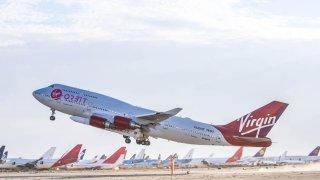
The modified 737 aircraft “Cosmic Girl” lifts off from Mojave Air and Space Port in California carrying a LauncherOne rocket on June 30, 2021.
- Virgin Orbit is assembling a fleet of rocket-launching 747 jets, the company announced, ordering two new modified cargo airframes that CEO Dan Hart says "unleashes us in a few ways."
- The added jets open "up all sorts of possibilities for supporting different customers in different places," Hart said.
- Virgin Orbit expects to take delivery of the first of the two new planes next year.
Virgin Orbit is assembling a fleet of modified 747 jets, the company announced Tuesday, ordering two new modified cargo airframes to help launch more rockets into space.
The company is acquiring the two additional airframes through L3Harris, which will modify the jets to carry and launch Virgin Orbit's rockets. Virgin expects to take delivery of the first of the planes next year.
Virgin Orbit CEO Dan Hart said the delivery timing of the second plane will be "driven more by market demand" for launches. The deal "unleashes us in a few ways," he said. "It eliminates one of the key chokepoints that we have in the system," Hart told CNBC.
Get top local stories in San Diego delivered to you every morning. Sign up for NBC San Diego's News Headlines newsletter.
It also will help the company keep launches going in case one of their aircraft is undergoing maintenance, which will open up "all sorts of possibilities for supporting different customers in different places," he added.
Virgin Orbit has a single aircraft, a customized Boeing 747-400 called "Cosmic Girl," which has flown four missions of Virgin Orbit's LauncherOne rocket to date. Through a method known as air launch, the company's aircraft carries its rockets to about 45,000 feet of altitude and drops them just before they fire their engines and accelerate into space — a method the company touts as more flexible than ground-based systems.
Hart declined to specify the financial details of the deal with L3Harris, but noted that the upfront cost of a 747 airframe is in the "single digit millions."
Money Report
Virgin Orbit's new 747s will also feature an improved layout, with L3Harris modifying the aircraft to carry up to two LauncherOne rockets, as well as all of the company's ground support equipment, to a launch site.
"The ability to deploy two rockets and all the ground equipment in one airplane, fly somewhere, set it up, and all of a sudden you've got a launch base somewhere is a pretty unique," Hart said. "It adds a certain level of unpredictability for the national security community [and] it's better economics for spaceports."
Virgin Orbit went public via a SPAC in December. The company's stock has fallen about 44% from its debut as of Monday's close at $4.51 a share.
First U.K. launch coming up

Virgin Orbit's next scheduled mission is for the Pentagon. It will carry seven government satellites, planned for no earlier than June 29.
Next, the company expects to fly its first international mission, launching from Cornwall in the United Kingdom. To prepare for that mission, which is planned for the third quarter of the year, Hart said the company will do a full wet dress rehearsal of the Cornwall rocket at the company's current base of operations at Mojave Air and Space Port in California, before flying Cosmic Girl and shipping out its equipment to the U.K.
Adding more aircraft gives Virgin Orbit key flexibility to serve international demand. Outside the U.S., the company currently has launch agreements with the U.K., Japan and Brazil, as well as memorandums of understanding with Poland and Oman.
"We're having discussions with on the order of a half a dozen other countries as well," Hart said.
Virgin Orbit also is looking at governments owning the 747 aircraft themselves, with the company providing launch services for the countries. "That's the best economics because the logistics tail is pretty simple, and that's what we're going for," Hart said.






